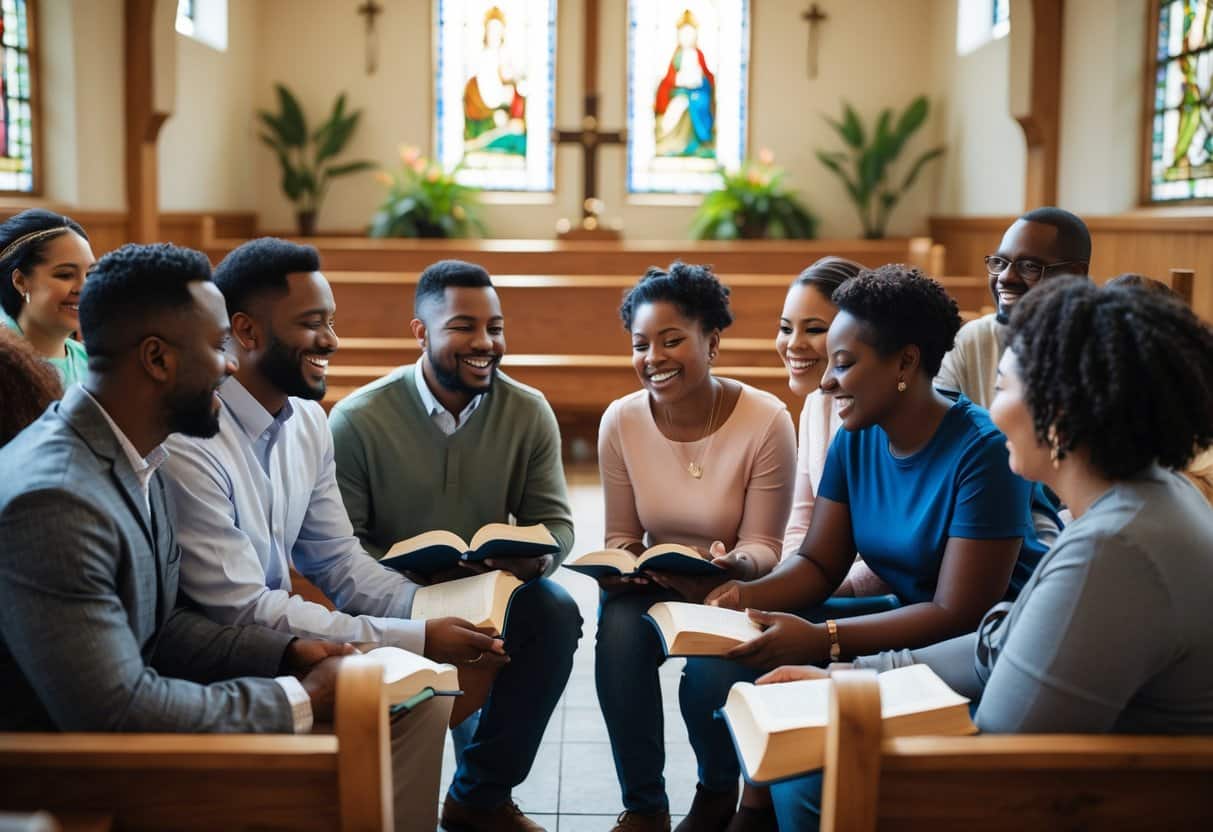Every church wants to help its members grow in faith and build stronger connections. Small groups add real value by creating a place where people can develop close relationships, study the Bible together, and support each other’s spiritual journeys.
These smaller communities make it easier for everyone to feel included and heard, no matter the size of the church.

Small groups encourage open conversations, accountability, and opportunities to serve. They offer a setting where members can pray for each other and address real-life issues, which helps strengthen the larger church family.
Research shows that small groups are a practical way for churches to foster growth, discover new leaders, and reach out to the wider community.
People often find it hard to connect during big gatherings, but a small group makes spiritual growth and friendships more personal.
When a church invests in small groups, it opens the door to deeper relationships and a stronger sense of belonging.
The Role of Small Groups Ministry in a Church
Small groups help churches create stronger connections and a deeper sense of belonging among church members. These ministries also mirror early Christian practices, building close-knit communities grounded in faith and support.
Building Meaningful Community
Small groups create a space where people get to know each other beyond casual greetings at church. Members meet often in homes or designated church spaces.
In these settings, trust grows naturally as people share stories and listen without interruption. Church members in small groups often pray for one another and remain involved with each other’s lives during the week.
When someone needs encouragement, it comes from people who know them well. This level of support can make large church settings feel much more personal.
Building true community takes time, but small groups give it room to grow. People are encouraged to be authentic about struggles and victories.
This builds friendships that last and gives members a support network within the larger church.
Fostering Connection Among Church Members
Small group ministries encourage regular interaction, helping church members form strong bonds. Instead of just seeing each other on Sundays, participants meet more often, deepening their relationships over time.
Frequent meetings help people feel less isolated. They talk about the Bible, pray together, and help each other grow.
When needs come up—such as illness, grief, or celebration—group members step in to help or share the joy. This sense of belonging helps new and long-time members connect.
Some churches have found that active small group programs lead to higher engagement and participation in church life, especially among those who might not otherwise volunteer or speak up in larger groups.
Embodying the Biblical Model of Fellowship
Throughout the history of the Protestant church, small groups have reflected patterns shown in the Bible. Early Christians often gathered in homes for worship, teaching, and meals, setting a model for today.
This structure encouraged spiritual growth and accountability. In small groups, church members read scripture, ask questions, and discuss real-life application.
This time together provides accountability, encouragement, and space to practice forgiveness, patience, and love. Many churches see small groups as a way to unify biblical values with practical, everyday relationships.
Members not only learn about faith—they experience it in action, echoing the biblical basis for small group ministry found in the book of Acts.
This approach helps churches embody New Testament fellowship in a modern setting.
Spiritual Growth and Discipleship Through Small Groups

Small groups provide a unique setting for believers to develop strong faith. They offer support, teaching, and a sense of belonging that encourages growth and commitment to following Jesus.
Encouraging Spiritual Maturity
Small group ministry is structured to help Christians become mature in their faith. Spiritual maturity involves more than just learning facts; it is about growing closer to God through relationships with others.
When people meet regularly in a small group, they practice prayer, apply biblical principles, and learn to serve one another. These actions take place in a supportive environment where questions can be asked and struggles can be shared.
Churches that invest in small groups see more consistent spiritual growth. Research highlights the importance of transformational relationships and authentic community for deepening faith and building maturity.
Promoting Accountability and Personal Growth
Accountability is a key part of discipleship. In small groups, members often set goals for spiritual habits such as regular Bible reading or acts of service.
Others in the group check in, offer prayer, and encourage progress. Personal growth is often more noticeable in smaller settings.
Honest conversations about challenges, doubts, and victories can happen in groups of trusted friends. Some groups use goal tracking tables or group chats to share updates, prayer requests, or spiritual insights.
This makes it easier for everyone to stay focused and support one another. Studies show that groups with regular attendance and genuine relationships foster noticeable change (learn more).
Facilitating Deep Bible Study
Small groups make it possible to study the Bible in a thoughtful and interactive way. Unlike large gatherings, these groups allow for open discussion, deeper questions, and personal stories related to the text.
Many use a mix of study methods, such as reading Scripture aloud, using study guides, or exploring real-life examples. Members are encouraged to share how biblical teachings relate to daily life and decision-making.
This approach leads to better understanding and more practical application. It also supports discipleship because everyone learns how to apply God’s word together.
Leaders often note that true spiritual transformation happens when people engage deeply with Scripture in a trusted, small group context.
Strengthening Evangelism and Outreach

Small groups are key to building strong connections, encouraging deeper faith conversations, and reaching those outside the church. Active small group ministry can help churches grow, foster outreach efforts, and empower church members to serve their communities.
Engaging Newcomers and Visitors
Small groups give newcomers a place to connect on a personal level. In a large church, it can be hard for visitors to feel seen or valued.
Meeting in smaller settings provides a more comfortable space to ask questions, share experiences, and build trust. Leadership in these groups can greet visitors, learn their stories, and introduce them to church life step by step.
It is easier for guests to make friends and return regularly. Small groups can follow up with visitors through calls, messages, or inviting them to special gatherings.
Research shows that churches with active small group ministries are more likely to keep new attendees engaged and involved. This helps people move from just showing up on Sundays to becoming committed, participating church members.
For more, see how active small groups support church growth and assimilation.
Serving the Wider Community
Small groups are often the engine behind many outreach efforts. Members can spot local needs—like hunger, loneliness, or lack of resources—and respond quickly.
When a church wants to support its town or neighborhood, small groups make it possible to organize volunteers and collect donations. Some small groups run food drives, support families in crisis, or visit the elderly.
Others help partner with schools and shelters. These practical acts of service help meet real needs and show the love of Christ in action.
Outreach through small groups builds trust and goodwill outside church walls. More churches are using small group outreach as a direct way to improve well-being in their area.
Nurturing a Missional Identity
A healthy small group ministry helps church members see their daily lives as opportunities for evangelism. In small settings, people can learn how to share faith stories, pray for others, and have honest discussions about God.
Groups encourage one another to look for opportunities at work, school, or in their neighborhoods. They may set goals for outreach, practice inviting others, and reflect together on what it means to be “sent.”
This keeps evangelism from being just a program and instead turns it into an everyday lifestyle. Encouraging a missional mindset within small groups helps every member become more confident in sharing their faith, both within and beyond the church.
Leadership Development and Member Involvement
Small groups create opportunities for church members to develop leadership skills and grow in their involvement. This leads to a stronger congregation, improved connections, and a higher level of commitment in church ministry.
Cultivating New Leaders
Small groups provide a practical environment for future leaders to gain experience. Acting as a group leader or facilitator lets individuals guide discussions, practice teaching, and support other members.
These roles help members learn how to handle responsibility and lead with Christian values. A structured approach, such as using a small group agreement or covenant, can clarify expectations for leaders and participants alike.
Regular rotation of leadership roles gives more members the chance to develop skills like planning, communication, and conflict resolution. Many churches see these new leaders step into larger leadership roles as their confidence and abilities grow.
For more insights, see how small groups help with leadership development and ministry empowerment.
Empowering Lay Participation
Small groups encourage every church member to be active, not just to attend. Through group activities and discussions, members contribute their ideas and talents, making each person feel valued and involved.
When members help plan meetings or lead Bible studies, they grow in faith and confidence. Many churches use small group ministries to organize outreach efforts and service projects in the local community.
This hands-on involvement allows members to see real results from their efforts, building a sense of purpose and ownership in the mission of the church. To read more about the importance of participation, visit the role of small groups in strengthening faith.
Enhancing Engagement in Ministry
Small groups serve as a bridge for members to get involved in greater church ministry. Regular meetings foster deeper relationships and trust, making it easier for individuals to express their gifts and passions.
As members identify their spiritual strengths, pastors can help them find roles in other church ministries. Churches that make small group discipleship a core part of their strategy often see higher rates of involvement in church activities.
Small groups can also equip members to serve as volunteers, ministry leaders, or even teachers. This consistent engagement helps build a lasting connection with the church mission and its people.
More details can be found by exploring how small groups can develop ministry skills and prepare future leaders.
Practical Benefits of Small Groups in Church Life
Small groups give church members a real shot at connecting and feeling like they actually belong. People find it easier to help each other and get more involved in the church community this way.
These groups let folks pray together, step up during big life changes, and encourage each other to stick around.
Encouraging Prayer and Care
There’s something about a small group that just makes prayer feel more genuine. In a smaller setting, people open up about what they’re really facing.
Members pray for each other in specific, personal ways, and honestly, that builds a kind of trust that’s hard to find elsewhere.
Beyond just prayer, small groups show up for each other in practical ways. If someone’s sick or having a rough week, people bring meals, make a call, or even drop by just to check in.
This kind of caring isn’t just nice—it’s what makes people feel like they actually matter.
Some churches have noticed that small groups make it way easier for everyone to share prayer needs and offer support. If you’re curious, the benefits of small groups are well-documented.
Key benefits include:
- More honest, specific prayers
- Real life support for struggles
- Members feel noticed and encouraged
Providing Support During Life Transitions
Life changes—moving, marriage, new kids, loss—can really throw people off. Small groups are a lifesaver during these times.
Members swap advice, pitch in with daily stuff, or just offer a listening ear when things get tough.
If someone in the group hits a crisis, others can jump in right away. Sometimes it’s babysitting, sometimes it’s dinner, sometimes it’s just sitting together in silence.
New folks especially benefit—they find friends fast and don’t feel lost in the crowd.
When people go through hard moments, knowing there’s a group that actually cares makes a world of difference. For a lot of folks, this is one of the biggest benefits of small groups.
Increasing Retention and Commitment
Honestly, small groups are one of the main reasons people stick around at church. When you feel connected, you’re way less likely to just disappear.
Close friendships and support make it easier to show up, serve, and keep going even when life gets busy.
Being part of a group means people notice if you’re missing. Someone will check in, and that kind of accountability really helps people stay involved and keep growing.
Churches that lean into small group ministry tend to have better retention. Turns out, when people feel like they belong, they’re more motivated to participate and help out. There’s even research showing churches with strong small groups are better prepared to adapt and thrive when things change.
Frequently Asked Questions
Small groups in churches offer personal support, spiritual growth, and deeper relationships. They help church members connect and grow in faith together.
What are the key benefits of participating in a church small group ministry?
Small groups give people a space to build strong friendships and receive personal support.
They create a safe place for sharing life, asking questions, and learning together. Members feel seen and valued in the church community.
How can small groups enhance the overall church community experience?
Small groups develop close relationships that are tough to form during big services. Members help each other in practical ways, like bringing meals or celebrating milestones.
When people feel connected, they’re more likely to stay active in church life. That unity encourages more folks to jump in and participate.
In what ways do small group ministries contribute to individual spiritual growth?
Members can dig into the Bible together and actually talk about how it fits into their daily lives.
People get to ask questions, get encouragement, and just feel supported in their faith journey. Small groups often include prayer and accountability, which helps members stay focused and make positive changes over time.
What types of small groups are commonly found within church ministries?
Churches offer groups by age, life stage, or interests—think youth groups, men’s or women’s Bible studies, or parenting classes.
Some churches run support groups for folks facing similar challenges. Others focus on outreach, service projects, or learning new skills, so there’s usually something for everyone.
How do church leaders effectively manage and resource small group ministries?
Usually, they train group leaders and give them some clear direction so things don’t go off the rails. Leaders might get materials, discussion guides, or even a room at the church to meet in.
Regular check-ins help make sure groups are meeting members’ needs and staying on track with what the church is aiming for. If problems pop up, they’re addressed before they get too big.
Why might some individuals feel resistant to joining small groups at church?
Some folks just feel shy, or maybe a bit unsure about stepping into a new group where they don’t know a soul. It’s understandable—being the newcomer isn’t always fun.
There’s also the worry about privacy. Not everyone wants to open up or share personal stuff with people they’ve just met.
And then, let’s be honest, life gets busy. The thought of adding another commitment, like a small group, can seem overwhelming.
Maybe if churches offered more flexible group options or just showed a little extra understanding, it would help ease those hesitations.

